7 Best Project Management Apps for Contractors
When managing construction projects, outdated systems and scattered communication can cause delays, cost overruns, and compliance headaches. Project management apps solve these problems by centralizing scheduling, budgeting, communication, and compliance in one place. Here are the seven best apps tailored to contractors:
- Project Lens: Best for real-time collaboration, task management, and cost tracking ($25/month/user).
- Buildertrend: Ideal for residential contractors with strong client communication tools ($99/month).
- Procore: Designed for large-scale commercial projects with advanced compliance and reporting features ($375/month).
- Knowify: Great for small to mid-sized contractors needing precise financial management ($49/month).
- Jobber: Perfect for service-based contractors managing recurring jobs ($29/month).
- Buildxact: Combines estimating and task management for residential projects ($99/month).
- Mobile-Punch: Focused on workforce management with GPS-enabled time tracking ($3/month/user).
Each app caters to specific needs, from large commercial teams to small businesses. Below is a quick comparison to help you choose the right one.
Quick Comparison
| App | Scheduling | Budgeting | Team Collaboration | U.S. Compliance | Starting Price (USD) |
|---|---|---|---|---|---|
| Project Lens | Excellent | Good | Excellent | Good | $25/month/user |
| Buildertrend | Excellent | Excellent | Good | Excellent | $99/month |
| Procore | Excellent | Excellent | Excellent | Excellent | $375/month |
| Knowify | Good | Excellent | Fair | Good | $49/month |
| Jobber | Excellent | Good | Good | Good | $29/month |
| Buildxact | Good | Excellent | Fair | Good | $99/month |
| Mobile-Punch | Good | Fair | Good | Excellent | $3/month/user |
These tools can help contractors streamline operations, improve efficiency, and stay on budget. Choose based on your team size, project type, and specific needs.
7 Best Construction Project Management Software 2025 (Full Demo)
1. Project Lens
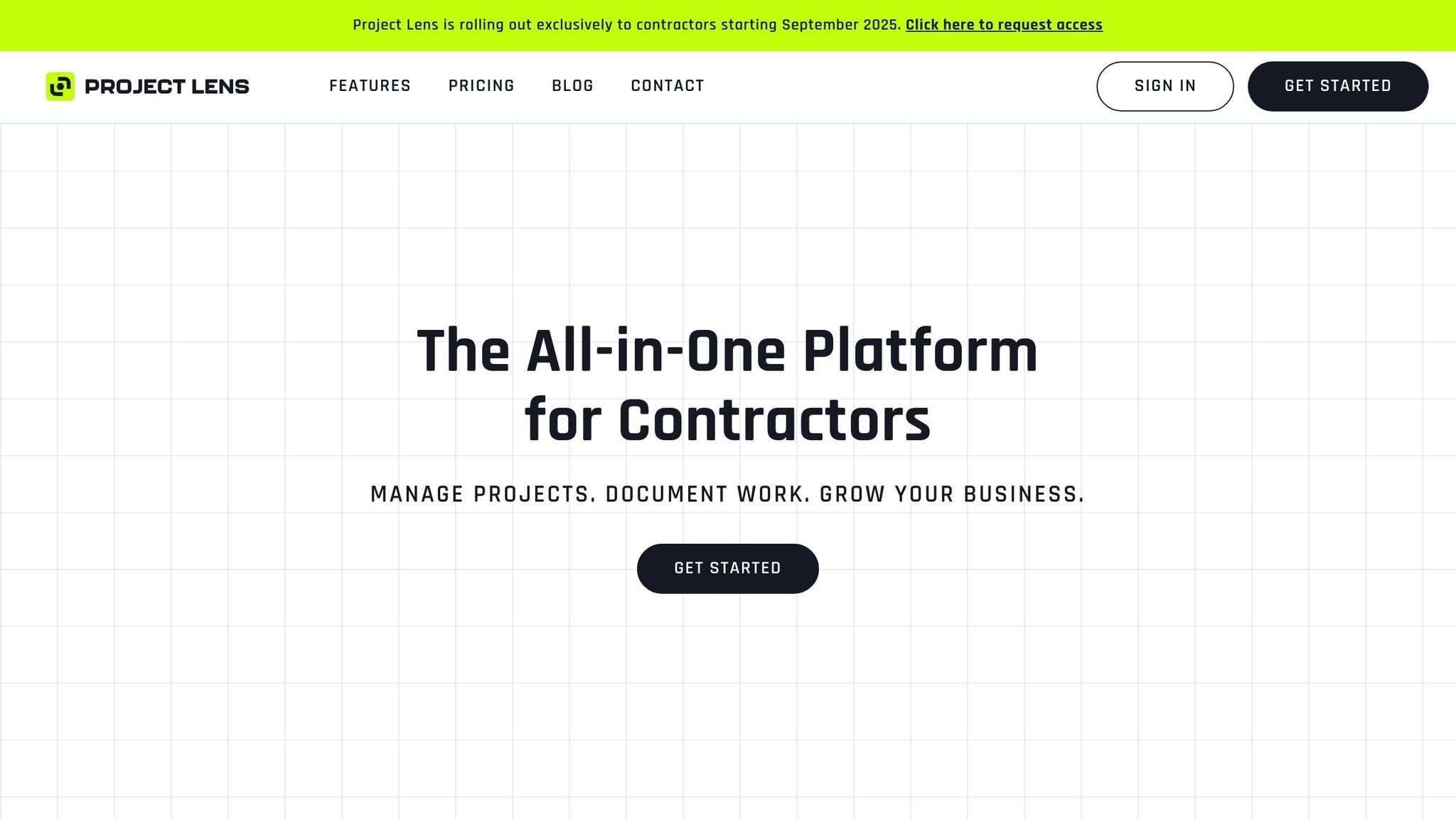
Project Lens is a project management platform designed specifically for contractors and trades professionals. It tackles key challenges like managing project schedules and ensuring seamless communication across multiple job sites.
Scheduling and Task Management
Keeping construction projects on track is easier with Project Lens's task management tools. Contractors can craft detailed project schedules, assign tasks to specific team members, and monitor progress in real time. Plus, real-time notifications ensure everyone stays updated on changes to schedules or tasks.
The platform's activity feeds bring all project tasks into one place, helping teams spot delays early. Team members can update task statuses directly from their mobile devices - whether they're on-site or in the office - ensuring that schedules reflect actual progress.
Up next, let’s look at how the platform simplifies cost management.
Budgeting and Cost Control
Project Lens streamlines cost management with its built-in expense tracking features. Contractors can keep a close eye on spending throughout the project, comparing it to initial budget estimates. Its custom pipeline management system tracks projects from the initial estimate to final payment, helping maintain cash flow oversight and profitability. It also ensures that change orders are properly documented and approved, so there are no surprises later.
Now, let’s explore how Project Lens strengthens team communication.
Team Collaboration and Communication
Keeping teams connected is a breeze with Project Lens's collaboration tools. The platform includes comments and mentions features, allowing team members to communicate directly within tasks or project elements. This eliminates the confusion caused by scattered emails or text messages.
With up to 5GB of media storage per project, teams can upload and store photos and videos to document progress or highlight issues. This creates a detailed visual record without the worry of running out of storage space.
For teams working across multiple sites, location intelligence tools like geocoding and map visualization help streamline coordination. Mobile apps for iOS and Android provide instant access to project data and communication tools, ensuring everyone stays in the loop.
Need to share updates with clients or stakeholders? Project Lens can generate professional PDF reports, summarizing project progress, costs, and timelines. These polished reports not only keep clients informed but also serve as essential documentation for billing.
The platform also integrates smoothly with other construction software, allowing contractors to maintain their existing workflows while benefiting from centralized project management. To top it off, robust security features like role-based access and audit trails ensure that sensitive information stays protected and accessible only to authorized users.
2. Buildertrend
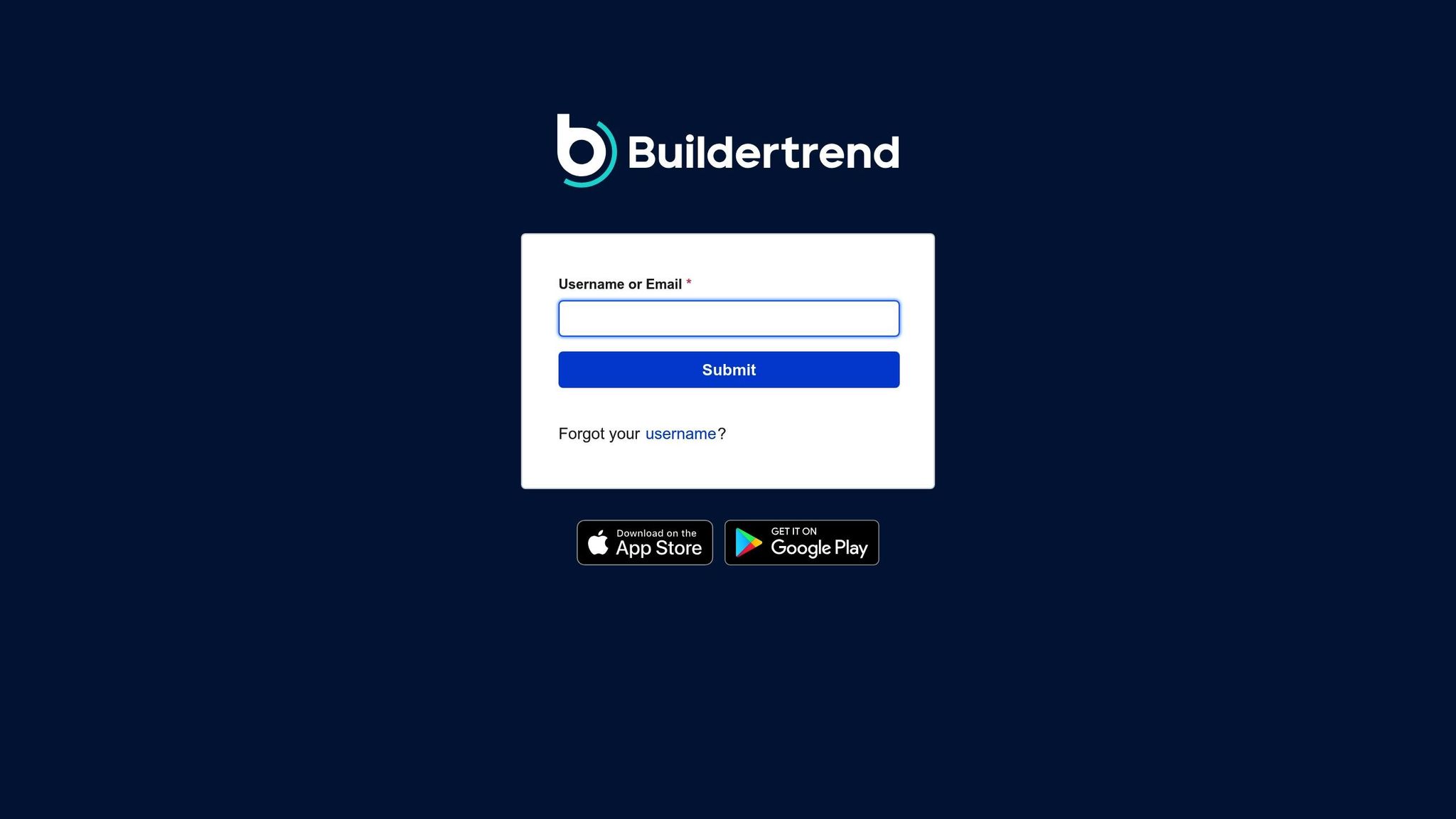
Buildertrend stands out by offering tools tailored specifically for residential construction and remodeling projects. It simplifies operations for residential contractors, custom builders, and remodelers, covering everything from the initial client interaction to project completion and warranty management.
Scheduling and Task Management
Buildertrend’s scheduling tools rely on interactive Gantt charts and calendars. Contractors can set up detailed project timelines with task dependencies, and the system automatically adjusts schedules if delays occur. Automated reminders ensure team members stay on top of deadlines.
The daily logs feature helps field supervisors document everything from weather conditions to crew attendance and daily accomplishments. These logs are invaluable for tracking progress and can serve as records for insurance claims or resolving disputes. Subcontractors can also update task statuses through the mobile app, which syncs with daily logs for seamless project tracking.
With time tracking, workers can clock in and out from job sites using GPS-based tools. This not only ensures precise payroll calculations but also provides project managers with real-time labor cost data, helping them compare actual hours to those budgeted.
In addition to scheduling, Buildertrend offers robust financial tools to keep projects within budget.
Budgeting and Cost Control
Buildertrend’s financial management features deliver comprehensive cost tracking across every project phase. Contractors can create estimates using a database of regional construction costs, ensuring accuracy.
Change order management simplifies the approval process by integrating directly with supplier catalogs. Clients can review and approve changes through the customer portal, cutting down delays linked to paper-based workflows. Once approved, the system automatically updates the project budget.
The platform’s purchase order tools also connect to supplier catalogs, allowing contractors to order materials while keeping an eye on budgets. It tracks delivery schedules and updates costs once invoices are received.
With progress billing, contractors can generate professional invoices based on the percentage of work completed. These invoices can include photos and detailed descriptions, offering transparency that helps speed up payment processing.
Team Collaboration and Communication
Buildertrend centralizes project communication in its message center, where conversations are organized by project phase, trade, or specific issues. This eliminates the chaos of scattered email chains and ensures key details are easy to find.
The customer portal gives homeowners real-time access to project schedules, progress updates, and photos. Clients can approve selections, review change orders, and communicate with the project team directly, reducing the need for phone calls or site visits.
Photo management tools automatically sort images by date, location, and project phase. Field teams can upload progress photos that sync instantly to the cloud, creating a visual project record. With markup tools, team members can annotate photos with notes, measurements, or issue highlights.
All project documents - contracts, permits, warranties, and technical drawings - are stored in an organized, accessible system. This makes retrieving information quick and hassle-free.
U.S. Compliance and Reporting
Buildertrend helps contractors navigate U.S. construction compliance with specialized reporting and documentation tools. For example, it generates lien waiver documents that meet state-specific requirements across all 50 states, protecting contractors from payment disputes.
The platform’s warranty tracking feature automates reminders for inspections and maintenance schedules, supporting long-term client relationships - especially for custom builders.
An audit trail records all project changes, communications, and approvals with timestamps and user details. These logs are essential for insurance claims, legal disputes, or regulatory inspections.
Finally, safety documentation tools assist contractors in maintaining OSHA compliance by storing safety meeting records, incident reports, and training certifications. Automated reminders ensure that safety protocols are consistently followed and documentation stays up to date.
3. Procore
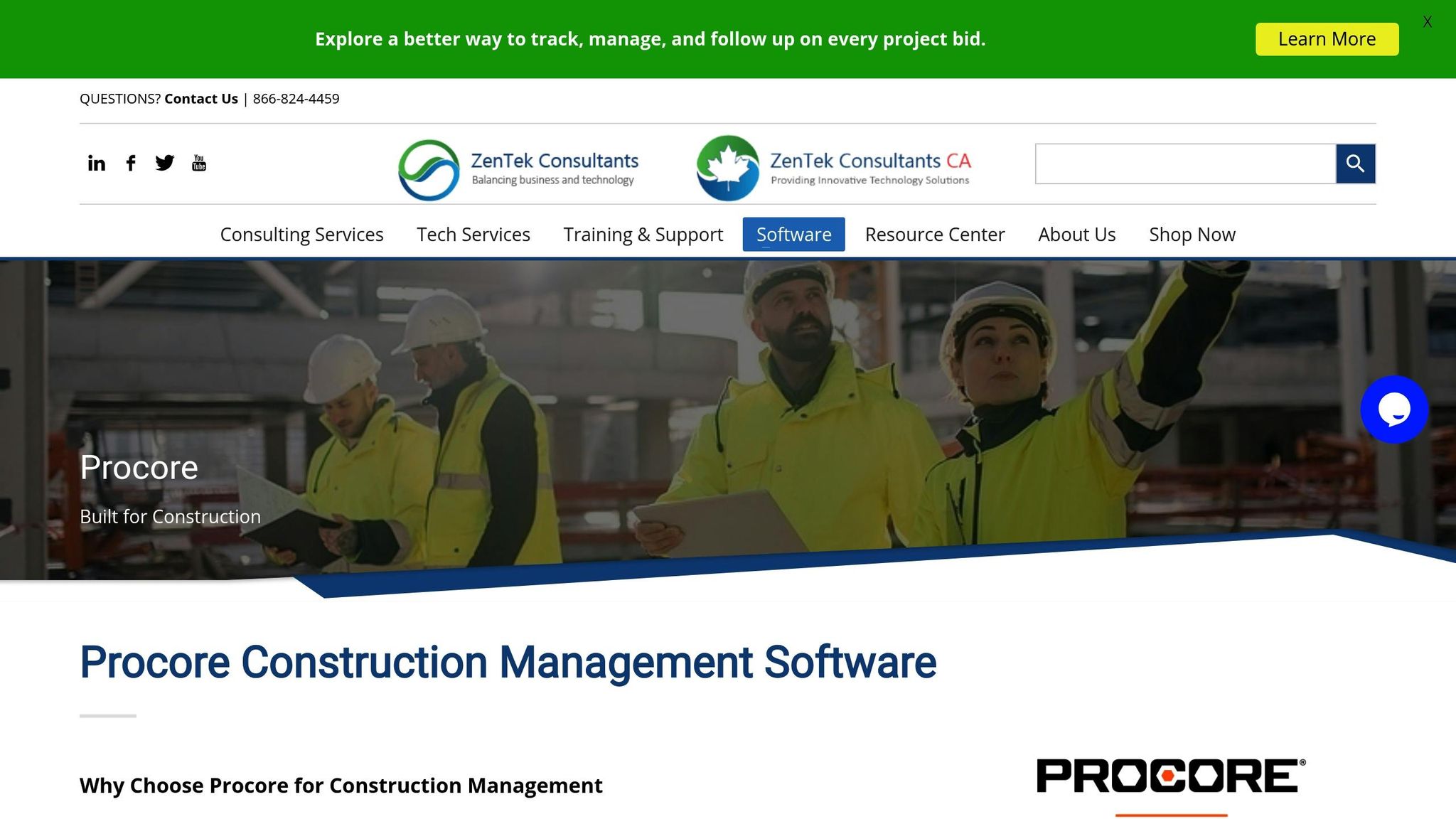
Procore is designed for commercial construction projects and large contracting operations, offering tools that handle complex workflows across multiple job sites. It's particularly effective for managing large-scale projects that require coordination among various stakeholders, detailed documentation, and strict compliance. Let’s dive into its standout features, starting with scheduling, which plays a crucial role in cost control and team coordination.
Scheduling and Task Management
Procore’s scheduling system integrates seamlessly with Primavera P6 and Microsoft Project, enabling contractors to import existing schedules without needing to recreate them. The platform’s lookahead scheduling feature identifies potential bottlenecks up to six weeks in advance, giving teams time to allocate resources proactively.
Its resource management tools provide a clear picture of equipment usage across job sites. Contractors can check availability, schedule transfers between projects, and track maintenance schedules to avoid costly downtime. Field supervisors can update equipment status in real time using the mobile app, ensuring everyone has up-to-date information.
Labor productivity is closely monitored by comparing actual hours worked to scheduled tasks. This data helps identify which crews are exceeding expectations and which might need adjustments, offering insights that are useful for future planning and assignments.
Daily reports automatically sync with schedules to reflect progress and flag any delays, keeping everyone on the same page.
Budgeting and Cost Control
Procore’s cost control tools work hand-in-hand with its scheduling features, offering detailed tracking of expenses across multiple cost codes and work breakdown structures. This provides a clear view of where funds are being allocated.
The commitment management system simplifies the approval process for subcontractors and vendors. Purchase orders and subcontracts follow customizable workflows to ensure proper authorization before commitments are finalized. The platform also tracks committed versus actual costs, helping teams spot potential overruns early enough to address them.
When it comes to change management, Procore creates a comprehensive audit trail, calculates the impact on both schedules and budgets, and routes approvals automatically for efficiency.
For billing, Procore generates AIA-style invoices that meet industry standards. It handles complex scenarios like stored materials, retainage calculations, and lien waiver requirements, even accommodating variations in state regulations.
Team Collaboration and Communication
Procore centralizes project communication with its correspondence feature, which organizes emails, meeting minutes, and formal notices by project phase and trade. This creates a complete communication history, making it easy to track decisions and approvals.
The drawing management tool supports large document sets, offering version control and markup capabilities. Field teams can access the latest drawings on their tablets, add markups or photos, and sync updates with the rest of the project team.
The RFI (Request for Information) workflow simplifies communication between contractors and design teams. RFIs are routed to the right parties with automatic reminders for overdue responses, and the system tracks response times to identify delays in the process.
Submittal management is another streamlined feature. Contractors can upload product data sheets and shop drawings, which are then routed through the approval chain. The system tracks the status of each submittal and sends reminders for pending approvals.
U.S. Compliance and Reporting
Procore is built to handle the regulatory demands of U.S. commercial construction. It generates certified payroll reports for prevailing wage projects, automatically calculating wage rates based on job location and trade classifications.
Safety management tools help ensure OSHA compliance by facilitating incident reporting, safety meeting documentation, and inspection checklists. The platform can automatically generate OSHA 300 logs and other safety reports while also providing training reminders.
For quality management, Procore supports compliance with building codes and project specifications. Customizable checklists cater to different trades and project phases, often requiring photo documentation and sending automatic alerts for failed inspections.
Document control is another key feature, tracking revisions and approvals to create an audit trail. This documentation is invaluable during inspections, warranty claims, or legal disputes.
With these advanced tools, Procore is well-equipped to handle the complexities of commercial construction projects in the U.S. market.
4. Knowify
Knowify helps small to mid-sized contractors manage field operations and financial tasks more effectively. It's designed to simplify project coordination and improve cost visibility, making it easier to keep projects on track and within budget.
Scheduling and Task Management
With Knowify, contractors can handle scheduling in a way that maximizes efficiency. The platform allows you to assign crews, equipment, and materials with ease. Its user-friendly interface lets you adjust resources on the fly and track time to monitor progress in real time. This streamlined approach to scheduling helps maintain tighter control over budgets.
Budgeting and Cost Control
When it comes to managing finances, Knowify keeps a close eye on labor, materials, and equipment expenses. It also handles purchase and change orders, ensuring spending stays under control while aiming to increase profitability.
Team Collaboration and Communication
Knowify serves as a central hub for updates, documents, and daily reports, making it easier for field crews and office staff to stay connected. This shared platform ensures everyone is working with the same information, reducing miscommunication.
U.S. Compliance and Reporting
For contractors working within U.S. regulations, Knowify simplifies compliance. It provides tools to organize payroll data and manage necessary documentation, such as lien waivers and other regulatory reports. This reduces the administrative load and helps teams stay focused on their projects.
sbb-itb-56a818c
5. Jobber
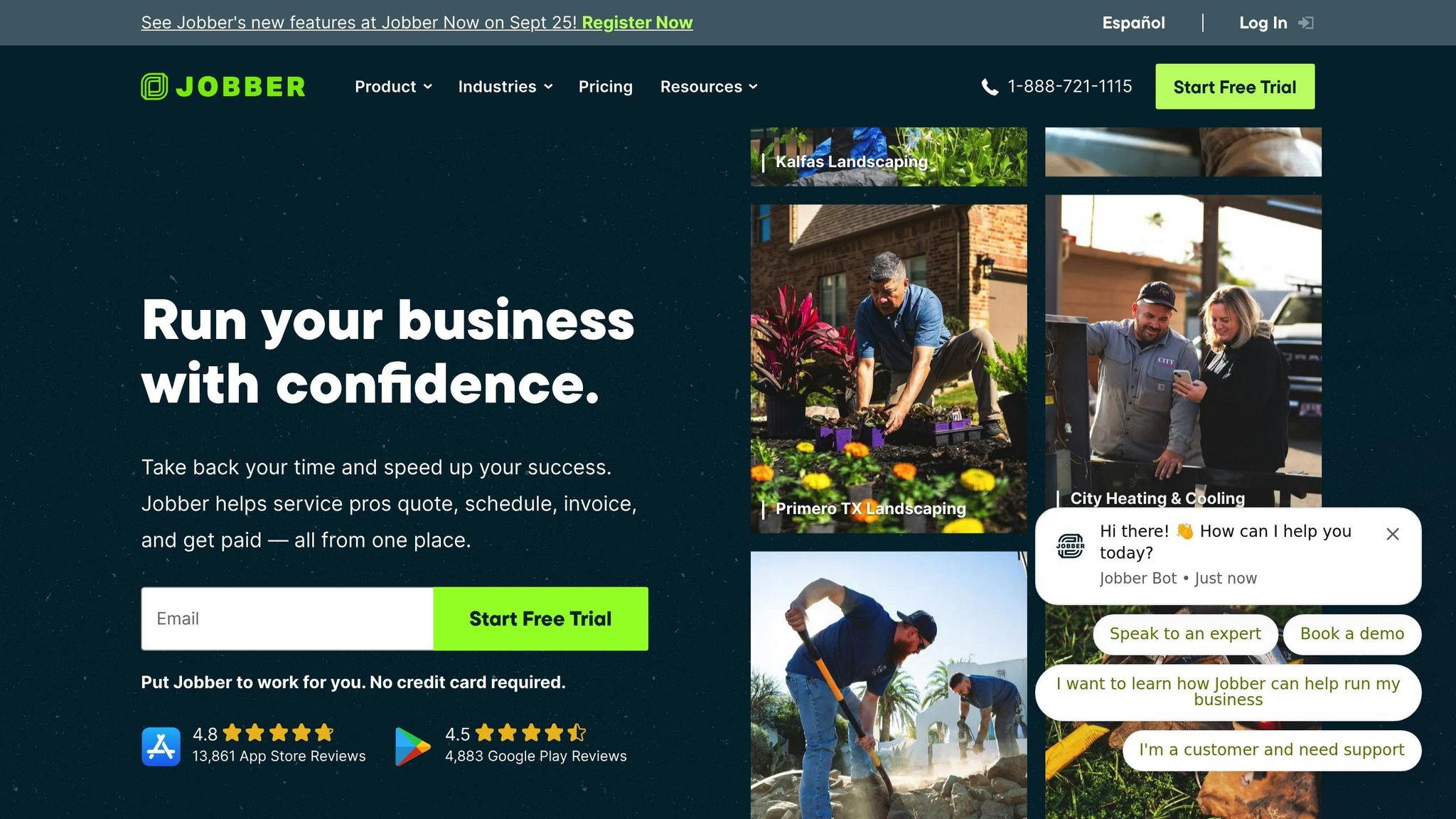
Jobber is designed specifically for service-based contractors, offering tools that cater to businesses managing multiple smaller projects rather than large-scale construction jobs. It covers the entire customer lifecycle, making it a go-to platform for contractors in industries like landscaping, HVAC, and cleaning services.
Scheduling and Task Management
Jobber simplifies scheduling, even when juggling multiple sites and appointments. With its drag-and-drop interface, you can easily move jobs between time slots, and the system automatically sends appointment confirmations to clients via text or email. Assigning tasks is just as smooth - you can match team members to jobs based on their skills and availability.
Recurring work is also a breeze. Whether it’s weekly lawn care or monthly HVAC checkups, Jobber automatically schedules these appointments and tracks their completion, ensuring no task slips through the cracks.
Budgeting and Cost Control
For financial management, Jobber offers easy-to-use tools for creating estimates and turning them into invoices. It keeps track of material costs, labor hours, and equipment usage for each job. You can even set up customized pricing for different services and apply markups automatically.
To streamline your accounting, Jobber integrates with QuickBooks, eliminating the need for duplicate data entry. This ensures all your project cost information flows seamlessly into your financial records.
Team Collaboration and Communication
Jobber’s mobile app and desktop platform make it simple for field teams to stay connected. Team members can access job details, upload photos, and add notes that sync in real time, keeping everyone on the same page. Automatic updates to clients - like appointment reminders, technician arrival times, and job completion notifications - help reduce the need for back-and-forth calls.
U.S. Compliance and Reporting
For contractors in the U.S., Jobber takes care of basic compliance needs, including tax calculations and reporting. It tracks employee hours and generates reports for payroll processing. The platform also stores customer records, job histories, and digital copies of contracts, permits, and other critical documents. This makes it easy to retrieve compliance-related paperwork for inspections, audits, warranty claims, or insurance purposes when needed.
6. Buildxact
Buildxact is tailored for residential construction and renovation contractors, offering a platform that streamlines everything from initial estimates to final invoicing. It boasts an impressive overall customer rating of 4.6/5.
Scheduling and Task Management
With its Onsite mobile app - available through Pro and Master subscriptions - Buildxact simplifies scheduling. This tool allows project teams to stay connected across devices, update task lists directly from the job site, and log daily start and finish times for tasks. For added convenience, Buildxact integrates with workforce management apps like Deputy, making payroll management and labor cost tracking much easier.
Team Collaboration and Communication
Buildxact’s communication tools are designed to keep everyone in the loop - whether it’s internal teams, subcontractors, or clients. For subcontractors, the platform streamlines processes by allowing contractors to send RFQ invitations, track responses, and compare quotes. It also keeps subcontractors updated via email and text.
For clients, the dedicated Client Portal acts as a secure hub where they can review material selections, digitally sign documents (like quotes, invoices, and variations), and monitor project progress with photos and updates. By centralizing all project communications, documents, plans, and images, Buildxact ensures that important information doesn’t get lost in scattered channels.
7. Mobile-Punch
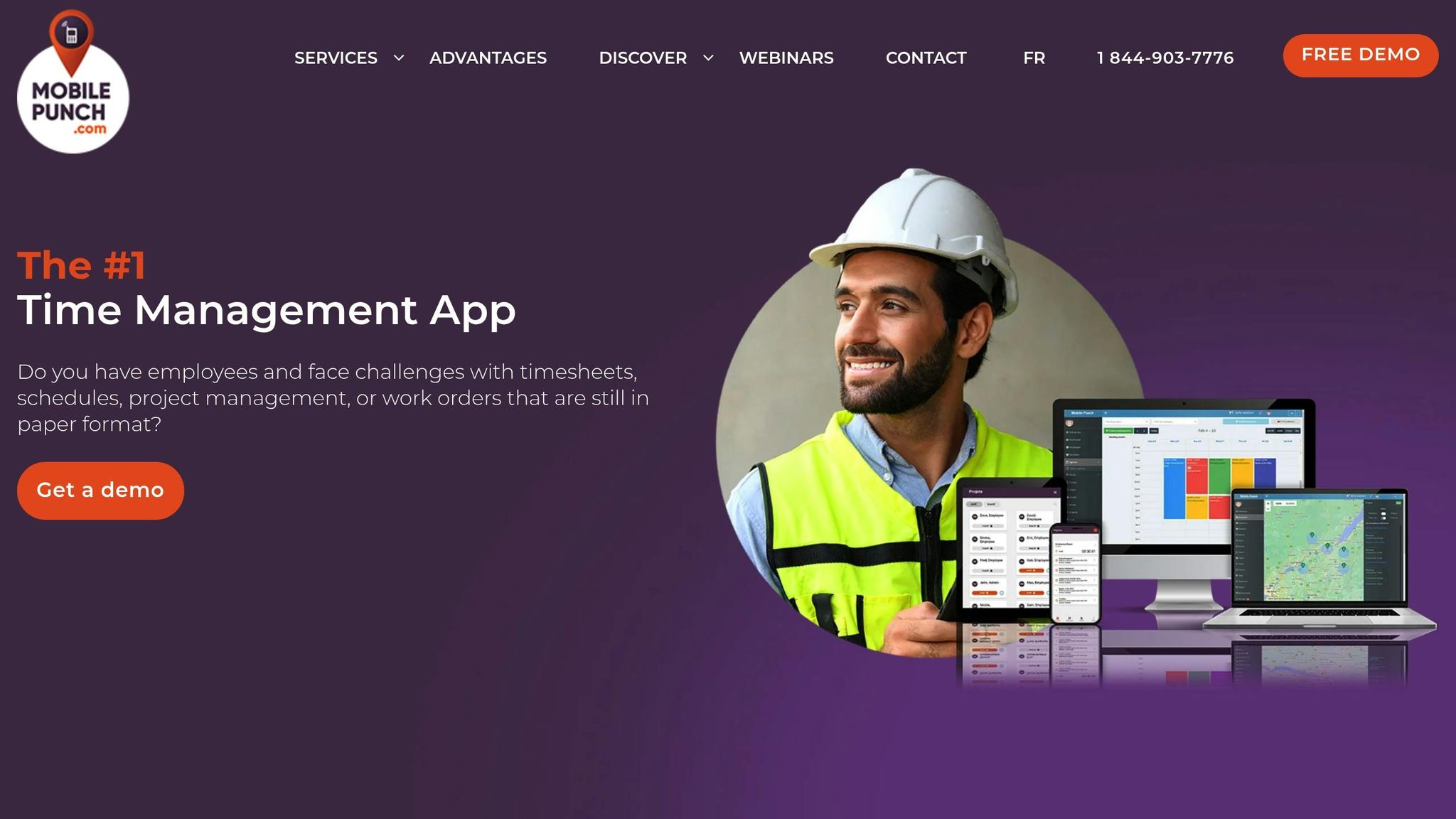
Mobile-Punch is transforming how contractors manage their on-site workforce by offering tools designed for real-time oversight and efficiency. It provides construction contractors with solutions for workforce management and time tracking, all powered by mobile technology that integrates location data.
Scheduling and Task Management
With Mobile-Punch, supervisors can create and manage work schedules in real time. Using GPS-enabled devices, they can assign tasks, monitor progress, and ensure every worker is accounted for. Field workers clock in and out directly from job sites, which not only ensures accurate attendance records but also allows project managers to break down projects into smaller tasks and allocate resources more effectively.
Team Collaboration and Communication
Communication between field teams and office staff becomes effortless with Mobile-Punch's messaging tools. Supervisors can send updates, safety alerts, and schedule changes straight to workers' mobile devices, keeping everyone on the same page.
The platform also includes a photo documentation feature, letting workers capture and share images from job sites. These photos come with automatic timestamps and location tags, creating a visual record that supports progress tracking and quality checks.
Compliance and Reporting
Mobile-Punch simplifies compliance with labor laws by offering detailed reporting tools. It tracks key metrics like overtime hours, break periods, and meal times, ensuring contractors maintain accurate records to meet regulatory requirements. This feature not only helps with compliance but also provides insights for better workforce management.
App Comparison: Pros and Cons
Choosing the right app boils down to your specific needs, budget, and team size.
Project Lens stands out with its contractor-focused workflows, unlimited photo and video storage, and strong project CRM capabilities. It’s perfect for teams needing real-time collaboration, thanks to live updates and activity feeds. At $25/month per user (billed annually), it’s cost-effective for many, though smaller contractors might find some of its enterprise features unnecessary.
Buildertrend is tailored for contractors who prioritize client communication and detailed project tracking. Its strengths lie in seamless project documentation and progress sharing with clients. However, it comes with a steeper learning curve and higher costs for advanced features.
Procore is designed for large-scale construction projects, offering advanced tools for document management and compliance tracking. Its extensive reporting features are a huge plus, but its complexity and pricing make it more suitable for larger organizations.
Knowify focuses on financial management, offering detailed job costing and profitability analysis. It’s a great fit for contractors needing precise budget control. On the downside, its project management features are less comprehensive, which might require users to supplement with other tools.
Jobber is ideal for service-based contractors, excelling in scheduling and customer management. It’s particularly strong for maintenance and repair contractors needing efficient job dispatching. However, it’s not suited for complex construction projects.
Buildxact combines estimating, takeoff tools, and project management, making it a solid choice for contractors who want to streamline bidding and project execution. Its weaknesses include limited customization options and fewer third-party integrations.
Mobile-Punch specializes in workforce management and time tracking, featuring GPS-enabled tools. It’s a great choice for contractors managing large field teams across multiple sites. However, it lacks comprehensive project management features, focusing primarily on labor tracking.
| App | Scheduling | Budgeting | Team Collaboration | US Compliance | Starting Price (USD) |
|---|---|---|---|---|---|
| Project Lens | Excellent | Good | Excellent | Good | $25/month/user |
| Buildertrend | Excellent | Excellent | Good | Excellent | $99/month |
| Procore | Excellent | Excellent | Excellent | Excellent | $375/month |
| Knowify | Good | Excellent | Fair | Good | $49/month |
| Jobber | Excellent | Good | Good | Good | $29/month |
| Buildxact | Good | Excellent | Fair | Good | $99/month |
| Mobile-Punch | Good | Fair | Good | Excellent | $3/month/user |
This table provides a quick snapshot of each app’s core features and starting prices, helping you weigh their strengths and limitations.
For contractors looking to streamline operations, Project Lens and Procore excel in team collaboration with tools like live updates and robust communication features. Meanwhile, Buildxact and Knowify focus more on individual productivity, offering tools for precise budgeting and profitability tracking.
When it comes to US compliance tracking, Buildertrend, Procore, and Mobile-Punch lead the pack with features like labor law compliance, safety documentation, and regulatory reporting. These platforms are especially valuable for contractors handling government projects or working in highly regulated industries.
For cost tracking and profitability analysis, Buildertrend, Procore, Knowify, and Buildxact are the go-to options. While Project Lens and Jobber provide solid budgeting tools, they lean more toward project execution rather than in-depth financial analysis.
Conclusion
Choosing the best project management app comes down to understanding your team’s needs, workflow, and budget. For contractors, Project Lens stands out with features like unlimited media storage, real-time collaboration, and an easy-to-navigate interface - all for $25 per user per month. Be sure to check out the app comparison chart above to find the option that fits your specific requirements.
FAQs
What should I look for in a project management app for my contracting business?
When picking a project management app for your contracting business, it's important to zero in on a few key aspects. Look for tools that are easy to navigate, work well on mobile devices, and can grow with your business needs. Make sure the app offers must-have features like scheduling, budgeting, team collaboration, and document management. It should also be able to handle the complexity of your projects and sync smoothly with any tools you're already using.
Don’t overlook the importance of reliable customer support and strong data security to keep your project information safe. By carefully considering these factors, you’ll find a tool that simplifies your workflow and helps your projects run more efficiently.
What features should contractors prioritize in a project management app?
When selecting a project management app, contractors should zero in on tools that make scheduling, budgeting, and team collaboration easier. Features like Gantt charts are great for project planning, resource allocation, and tracking tasks, ensuring everything stays organized. It's also important to have document management capabilities, including version control and secure sharing, to handle essentials like blueprints, contracts, and permits.
Look for apps that offer real-time communication tools, photo and file sharing, and options for managing punch lists and inspection tracking. These features streamline collaboration, speed up problem-solving, and improve compliance management, helping contractors stay on track and work more efficiently.
How do project management apps help contractors comply with U.S. construction regulations?
Project management apps make navigating U.S. construction regulations easier by streamlining critical tasks like safety monitoring, documentation, and reporting. These tools seamlessly incorporate compliance requirements into daily workflows, helping contractors stay aligned with legal standards and avoid expensive fines.
With features such as automated safety protocol tracking, real-time updates, and comprehensive reporting, contractors can confidently meet regulatory demands while keeping accurate records. Beyond reducing legal risks, these apps also enhance project efficiency, saving time and resources.
